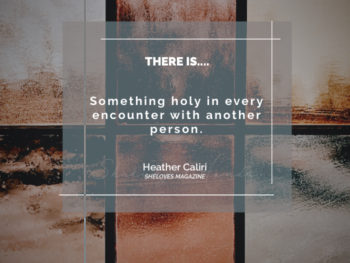
I’m trading my sorrows, trading my shame,
Laying them down for the joy of the Lord—
My dishrag stopped. I had been wiping down the black granite of my countertop, sweeping up stray ants. Yesterday, I had left a bit of ham on the counter, and I was still reaping the consequences.
Now, I listened to the lyrics of the song more closely:
I’m trading my sickness, trading my pain,
Laying them down for the joy of the Lord….
I wish I could say it was the first time I’d been rubbed the wrong way by Christian music. Much as I connect with Jesus through worship, sometimes the lyrics don’t sit well with me. Too easy, too trite. It’s only recently that I’ve been able to slough off enough cynicism to listen.
But this? This was more than a wince. This made me angry.
I stopped, breathed. What exactly was bothering me here? I, too have sorrows and shame, and when the Lord takes hold of them for me, it is always a blessed relief. A release to freedom. I believe the Lord turns our mourning into dancing. I believe in the empty tomb.
How was this song saying anything any different?
Then I realized: it was the subject of the sentence. I.
I am not going to lay down my sorrows. Ever. Only Jesus has that power.
New beginnings, joy, and life come from Jesus, not from us. Never, ever is it something that we can achieve on our own.
No: for me, the moment healing starts is when I finally give up trying. I give up trying to forget the sorrows, stop trying to cover them over, explain them away, or remove them with a lint brush.
Give up the idea that my sorrows can be discarded, managed, forgotten.
I have to give up any hope of painting a corpse, and depend on Jesus to raise it from the dead.
I can’t lay down my sorrows or shame. It is simply not in my power. To try to lay them down and trade them for joy is to cheapen healing. It’s to say it’s something we can pick up, easy as Kleenex, from a dollar store.
No, I need the power of the cross, of Jesus’ gentle, healing hands to have that shame and sorrow transformed into something lovely and beautiful.
Part of what angered me about the song is it reminds me of my old yoke of slavery.
For a long time, I thought that my inability to lay down my sorrows and shame meant that I had failed. That I was doing the Christian life wrong, was not connected well enough to Jesus’ power.
The fact that I was still sorrowed about the past ashamed me.
I thought I should have shed that shame, long ago, like a snake sheds its skin. I thought the fact that it was still around meant that I hadn’t done enough.
No more of that lie.
God doesn’t call us to lay down our sorrows. No—he asks us to take up our cross, which is quite a different thing.
Walter Brueggemann said, “The riddle and insight of biblical faith is the awareness that only anguish leads to life, only grieving leads to joy, and only embraced endings permit new beginnings.”
We are not supposed to set down our sorrow. No, we’re supposed to feel it more deeply, wail, mourn, gnash our teeth. Then, only then, can we see shame and sorrow as God sees them.
With grace and loving-kindness.
Taking up our cross starts by looking more closely at what sorrows and shames us. We resist: we want to set it down. We want get the hell away from it.
Instead, God tells us to take up those sorrows in our arms and own them, feel them, mourn them. And then, somehow, when we feel their true weight, Jesus is there with us, carrying them.
How this happens is a mystery: he’s there before, too, before we pick up the crosses. He is helping us bear them, is picking them up for us. Never—never!–is this a bootstrap effort.
**
I don’t think most of us are holding on to our anguish too closely. No: the real problem is that we keep it at arm’s length. We’ve numbed ourselves so we don’t have to feel our pain. The only way to the joy is right through the anguish. To feel more, not less. To see clearly, instead of through a glass, darkly.
Jesus was mourned in the tomb before he rose again. Why do we think we can bypass grief? Why do we think we can pull joy out of a hat like a two-bit magician?
Image credit: Jed Sullivan














Thank you for this beautiful insight. I have been in a pretty intense season of grieving and it has been difficult to find the words to let people know that I am grieving and in need of grace, but not pity. I’ve been here before and this time I know that it is a gift and I have been trying to lean into it. But I’ve been reluctant to express the true state of my grief because most people recoil at the word. 🙂 Thank you for helping me find the words I needed.
Hey, Misty. I hear you. And we are so trained to tell people we’re fine, we’re managing, that to truly allow ourselves to fall apart seems impolite. Yikes. I pray that we all have the bravery to become more and more awake to our real emotions.
Thank you, Lord, for these timely words! Something I’ve been pondering much of lately, just what do we do with the shame? This post worded it all so beautifully!
Thanks, Tamara! I pray we all have more and more freedom from shame, through Jesus’ incredible healing life-giving power.